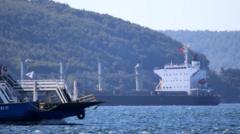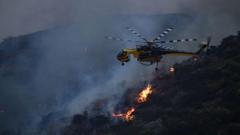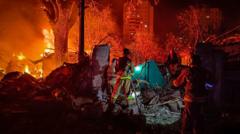As wildfires ravage Spain, the European Union has stepped in, deploying two aircraft to assist the firefighting efforts after Spain activated the EU's disaster assistance mechanism for the first time. Spain's Interior Minister, Fernando Grande-Marlaska, has expressed the need for urgent assistance as temperatures soar past 44°C amid a relentless heatwave. Following the tragic loss of three lives, the situation remains dire, prompting extensive evacuations across the country.
EU Rallies to Combat Wildfires in Spain as Death Toll Climbs

EU Rallies to Combat Wildfires in Spain as Death Toll Climbs
The European Union deploys support to Spain, marking an unprecedented response to devastating wildfires as fatalities increase.
In a historic response to escalating wildfires across Europe, the European Union has dispatched two Canadair water-bomber aircraft to support Spain's firefighting efforts. The aid comes in light of Spain's first-ever activation of the EU disaster assistance protocol, which was set in motion by Interior Minister Fernando Grande-Marlaska amidst rising temperatures and growing fire threats. The current crisis has led to the death toll reaching three, with numerous evacuations in heavily affected regions.
“Given the challenging weather conditions and the unfolding situation, we are taking every measure to ensure help is on the ground as swiftly as possible,” Minister Grande-Marlaska remarked during an interview. The introduction of the two planes aims to bolster Spain's efforts in combating the wildfires, which have already devastated significant areas, leading to 700 additional evacuations from Caceres.
In a poignant statement, Spanish Prime Minister Pedro Sanchez expressed condolences to those impacted by the loss of volunteer firefighters. “All government resources are mobilized to face this critical situation. The threat remains extremely high,” he conveyed on social media.
While Spain grapples with its challenges, other European nations, including Greece and Albania, are also grappling with wildfires fueled by a persistent heatwave. The Merger of intense Weath issues have seen other countries including Bulgaria and Montenegro activate similar rescue protocols. Already, the wildfires have consumed more than 439,000 hectares across Europe this year, compared to 187,643 hectares last year, highlighting the increasing threat posed by climate change.
As we face unprecedented climatic changes, the call for joint support and action in times of crisis is more urgent than ever.
The situation remains fluid, with more assistance and resources expected to be deployed to affected areas in the coming days.
As communities band together to confront these devastating blazes, the collective response emphasizes the importance of international cooperation in tackling the ever-increasing challenge of climate-induced natural disasters.
“Given the challenging weather conditions and the unfolding situation, we are taking every measure to ensure help is on the ground as swiftly as possible,” Minister Grande-Marlaska remarked during an interview. The introduction of the two planes aims to bolster Spain's efforts in combating the wildfires, which have already devastated significant areas, leading to 700 additional evacuations from Caceres.
In a poignant statement, Spanish Prime Minister Pedro Sanchez expressed condolences to those impacted by the loss of volunteer firefighters. “All government resources are mobilized to face this critical situation. The threat remains extremely high,” he conveyed on social media.
While Spain grapples with its challenges, other European nations, including Greece and Albania, are also grappling with wildfires fueled by a persistent heatwave. The Merger of intense Weath issues have seen other countries including Bulgaria and Montenegro activate similar rescue protocols. Already, the wildfires have consumed more than 439,000 hectares across Europe this year, compared to 187,643 hectares last year, highlighting the increasing threat posed by climate change.
As we face unprecedented climatic changes, the call for joint support and action in times of crisis is more urgent than ever.
The situation remains fluid, with more assistance and resources expected to be deployed to affected areas in the coming days.
As communities band together to confront these devastating blazes, the collective response emphasizes the importance of international cooperation in tackling the ever-increasing challenge of climate-induced natural disasters.




















